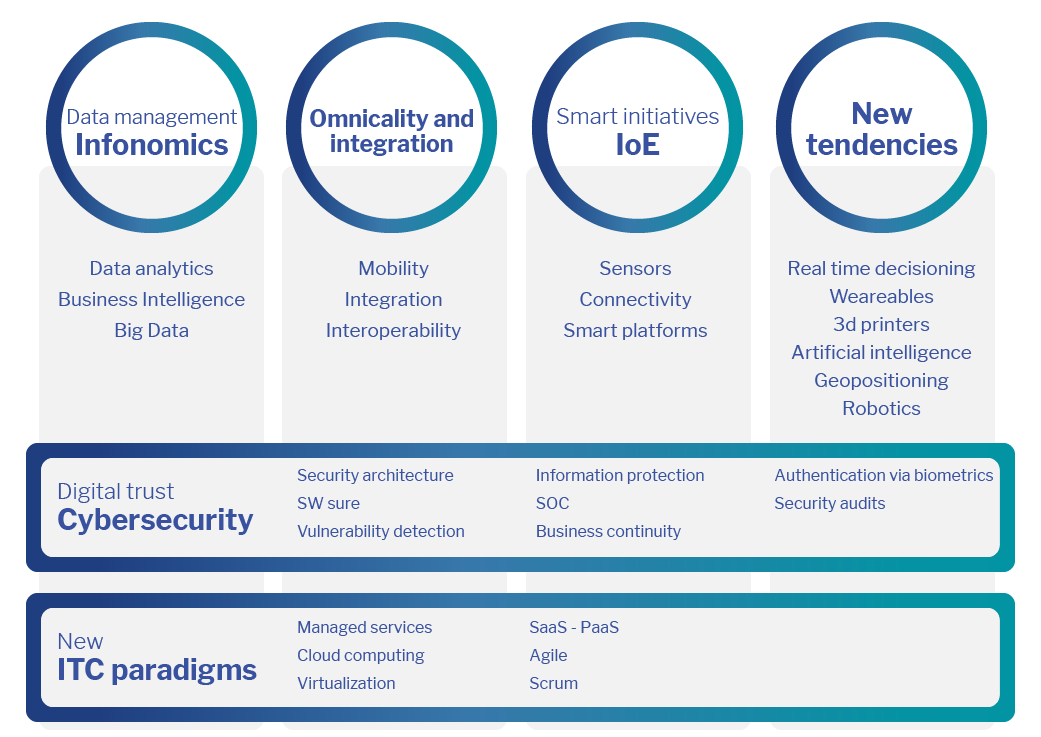Technology takes decades, transforming the way in which we live and work, so it's time to stop talking about Digital transformation, to move on and to take on new realities and challenges.
The phenomenon of Transformation Digital Revolution
Recently in a meeting with a senior manager of one of the leading companies in our country, he said that the first person that mentioned "Digital Transformation" would have to put a euro on the table. Needless to say, we paid him a good breakfast with the money won.
Everyone talks about Digital Transformation regardless of the sector of activity. You're nobody if you haven’t addressed a Digital Transformation project, or if it is not your star product or service in the case of dedicating yourself to the consulting or technological sector.

The truth is that we have been applying technological advances to our lives for several decades, and of course in our daily business activity: eCommerce, B2B, electronic administration, paperless management, ERPs and many more examples of the changes we have been experiencing. Although technology has been transforming the way we live and work for decades, in the last few years a series of triggers have appeared that have caused a definitive push towards what we can define as a true Digital Revolution Among others:
- The exponential and continuous advance of technology.
- Universal access to state-of-the-art mobile devices.
- The arrival of IoE (internet of everything): access to valuable information about things and people.
- The appearance of new disruptive trends: AI, robotics, 3D printing.
- The leadership of global technology companies, even in traditional sectors of the economy.
- Technology as a tool and facilitator for new businesses.
Indeed, all this means that it is totally appropriate to talk about the Digital Revolution. There are some undeniable facts that support this assertion. Here are a few:
- Most of the leading global leaders did not exist 15 years ago.
- Most of them are technological giants that increasingly operate in new sectors.
- Technology has led to the reinvention of numerous industries (record company, media, ...).
- Technology generates innumerable business opportunities (and does not always require a lot of investment).
There is no limit to progress: there is someone who is talking about achieving immortality in a few decades thanks to the advances that technology will provide. We can define the transformation or digital revolution as the process of change induced by the technological advances, which transform the way in which we interact, work, buy, enjoy our free time, take decisions, and ultimately live.
The implications of the Digital Revolution in our organizations
This means that the new digital paradigm has implications at all levels of an organization:
At the strategic level:
- Cultural change.
- New expectations and demands from clients and stakeholders.
- New business models based on technology.
- Changes in the organization: new directions to lead the change.
- R & D + i budget increase.
- Continuous improvement: alert to disruption.
- Importance of alliances.
- New opportunities: Return on investment in R + D + i, new channels of interaction with the client, knowledge (of the client, the environment), the value of the data, and so on.
- New threats: New ecosystems and digital platforms (e.g.: collaborative economy), new players (e.g.: FINTECH, INSURTECH, ...), David vs. Goliath, cyber attacks, etcetera.
At the process level:
- Radical transformation of business processes: disruption.
- Improvement in efficiency.
- Quality orientation (eg: Lean / Six - Sigma).
- Automation, robotization.
- IoE in daily operations.
- The data as a key element for differentiation.
At people level:
- The people in the centre of the digital world.
- New skills are required.
- Our education system still does not respond to the future needs (or to the current...).
- Obsolescence of the work force.
- The management of people as a key to prevent crises arising from technological advances.
- New challenges in organizations:
- Continuous training - eLearning.
- Ability to adapt continuously to whats new.
- Demand for new profiles.
At the technological level:
Technology is a means, not an end. But it is the key element in the process of the digital revolution. The depth of change is marked by technology.

How do we deal with a process of digital transformation
There are no magic formulas, and each organization will have its own requirements. But there are a number of aspects that must always be taken into consideration when dealing with a complex process of digital transformation:
- Sponsor at the highest level (Board and CEO).
- Assign responsibility to level C (CEO, CIO, CTO).
- Restructure your organization if necessary.
- Look for talent.
- Reflect on the future of the organization.
- Analyse what the competition does.
- Prepare cultural change.
- Test without fear: Everything except immobilism.
- Exceed the needs of your customers.
- Manage information: Take advantage.
- And most importantly: Investment, Passion and Conviction.
By way of conclusion
We are facing a true Digital Revolution. This revolution is going to affect the pillars of our organizations. And it's a process that starts, but does not end. This implies processes of continuous improvement, investment and abandonment of the comfort zone.
And let's never forget that the focus of this change is the person: clients, citizens, employees and / or taxpayers.
And you, are you ready? How will you deal with your own revolution?
Alberto Loureiro. Associate Director of Altia.
